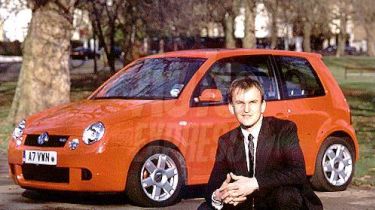Volkswagen Lupo
Thanks to great build quality, an upmarket image and mature road manners, VW's baby has won thousands of fans since its introduction in 1999. Indeed, the German firm is so proud of the car, it named it after its home town of Wolfsburg - Lupo is Latin for wolf.
Thanks to great build quality, an upmarket image and mature road manners, VW's baby has won thousands of fans since its introduction in 1999. Indeed, the German firm is so proud of the car, it named it after its home town of Wolfsburg - Lupo is Latin for wolf.
A broad range adds to its appeal, with everything from a thrifty diesel model to a fire-breathing GTI on offer. The only downside is the price. Some may argue that the SEAT Arosa, which shares the Lupo's platform and engines, is a better buy as the VW seems expensive in comparison. Cer-tainly, Lupos aren't cheap.
But while strong residual values might make second-hand examples expensive, the cost works in your favour when it comes to resale time - expect a Lupo to be worth twice as much as a virtually identical Arosa when it reaches seven years old.
If you're planning on keeping it for a while, then the Lupo makes real financial sense, while early impressions suggest it's living up to VW's traditionally excellent reliability.
Checklist
* Lupos are largely reliable, apart from the odd electrical niggle. Remote locking can fail, as can power window switches.
* Airbag sensors can easily pick up a fault code if knocked, causing the dash warning light to illuminate. If the bag isn't faulty, a dealer can reset this in minutes.
* Some owners have reported catalytic convertor trouble on early cars, caused by damage to the low-slung exhaust.
* Aluminium panels on GTIs are prone to denting - and replacements are pricey. Look out for parking knocks.
* Interior trim wears quickly compared to larger VWs. Door nets, grabhandles and heater controls are especially vulnerable, and can rattle with age.
Glass's View
The Lupo is one of the most sought-after second-hand city cars, according to trade bible Glass's Guide - and as a result, bargains are few and far between. But if you're looking for a cheap-to-run, compact and quality motor with a strong image and a great sense of fun, the little VW takes some beating. The popularity of the badge means you'll easily be able to sell it on when the time comes.
My Lupo...
Stephen Larkin had never considered a city car until his job meant he had to move from Porthcawl, south Wales, to central London. The 34-year-old civil engineer has always been a VW fan, and previously owned a Golf TDI, but decided to swap it for a Lupo. Initially, he bought a 1.4 TDI Sport, but a problem with the turbocharger meant he rejected it - and he decided to replace it with a GTI.
He covers around 9,000 miles a year in the Lupo, and finds it good enough for his needs. "It has great character," Stephen told us. "I love the looks and performance - my only gripe is that the fuel tank is too small." That said, he doesn't find the car's size a problem. "There's only ever two of us in it, so it's big enough," he explained. "I even had a tumble drier in the back with the seats down!"
Stephen is waiting for VW to sort the Lupo's brakes, which have been squeaky since he bought the car a year ago. "They have to be cleaned every couple of months or it sounds like a ship coming in to port," he said. "VW says it's a known fault and that a fix is on the way, but I've yet to hear anything."
Verdict
For all-round performance, our favourite is the 1.4 TDI Sport, which offers lively performance and great economy. But its popularity means prices are high. A 1.4 SE petrol Lupo gives the best combination of performance, economy and kit at a sensible price. The GTI is expensive new, but better value used, and a fine alternative to a MINI Cooper.






